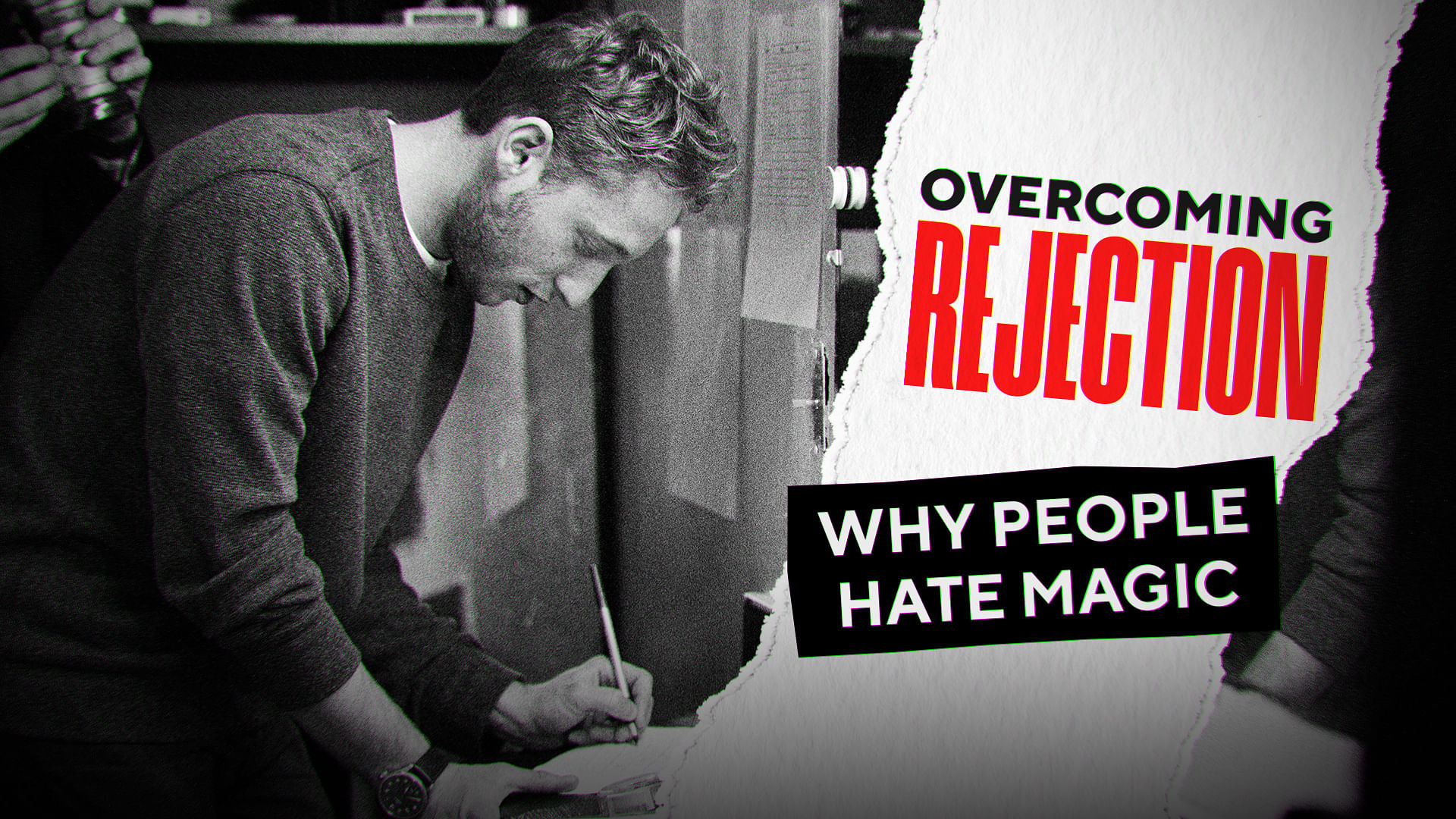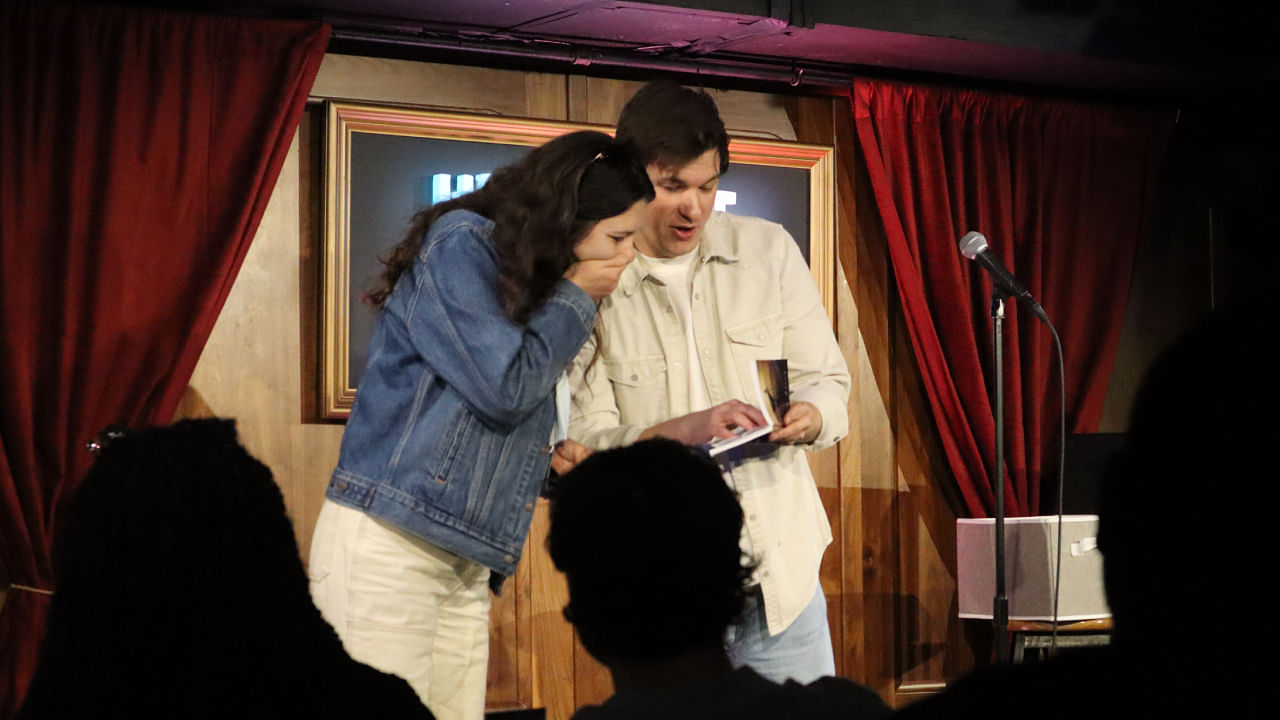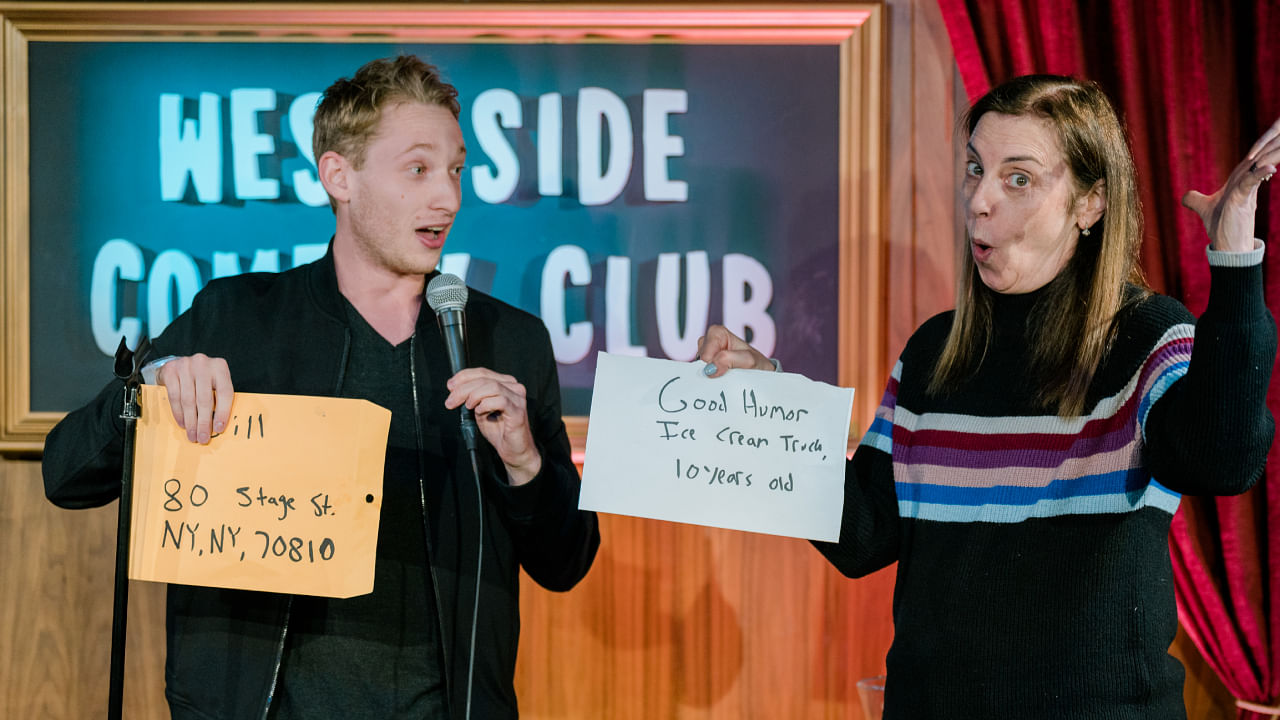Why People Hate Magic
By Max Davidson - Thursday, May 18, 2023
Welcome back to the third, and final, installment of Overcoming Rejection, a first-hand look at how to overcome the challenges of being a full-time professional magician. The first two posts talked about five lessons for dealing with rejection and how to manage receiving a “no” from a potential client. I do suggest you give them a read before continuing.
For the final post, we talk about what happens when a person rejects you and your magic. More broadly, we discuss why someone might reject magic in the first place, and what to do about it.

Although tactical advice like how to sell tickets at certain prices is extremely important, when it comes to overcoming challenges, nothing beats a healthy attitude. Your mindset is entirely within your control. And cultivating an attitude of resiliency, kindness, and respect, is just as, if not more important, than being a technically skilled magician.
The person who this is about will never read this because she hates magic. So it’s unlikely she knows that Vanishing Inc exists, nor would she be very interested in a site that peddles “the work of the devil.”
At a recent gig, the woman in question didn’t want to see a magic trick because she didn’t trust magicians. If I showed her magic, she’d end up with her shoes tied together, or something stolen. And she knows this because she’s seen the YouTube videos. She doesn’t trust magicians.
We’ve all been turned down during strolling gigs before—sometimes people are in the middle of a conversation, sometimes they’re having bad days. It doesn’t happen often, but anyone who outright dismisses you wasn’t going to be a good audience anyway. So, I always just move on.
But I was so confused by her response–not offended, but confused–that, about an hour later, I pushed her a little for more details.
Toward the end of the gig, I asked her if she wanted to see magic again. She said no. And I said “Are you sure? Just one trick that will take less than a minute?” I looked down and noticed a line on the floor between tile and hardwood. She was on the hardwood. I stepped onto the tile. “I’ll even stand on this side of the line so that you know I won’t tie your shoes together or steal something from you.” I felt absurd saying this, but it worked. “Ok. Just one trick.”
I did a short, simple, punchy trick. I put a business card in her hand. She thought of a place in the world, and the city she was thinking of was written on the business card. I thought she genuinely liked it. So I walked away and continued working.

“Let me tell you why I hate magic…”
But then she approached me at the end of the night, saying “Let me tell you why I hate magic.”
Quite the opener.
This has happened a few times, and I really don’t get bothered by it.
Sidenote: The best insights come when someone is willing to be honest with you. Never shy away when someone is willing to tell you the trick from your show they think you should cut, or what they think the method is. The worst thing you could do in this scenario is dismiss them as a “moron” or someone who “just doesn’t get it.”
Now, in regards to my conversation with this woman, I, of course, said “Tell me.”
To which she responded: “To me, the entire point of seeing a trick is figuring out how it’s done. So when you show me something like this, I just want to know the secret. I have respect for what you do, so I’m not gonna ask you how it’s done, but now I’m gonna be mad all night that I don’t know how to do the trick.”
Now I understood. She probably wasn’t truly worried I’d tie her shoes together or steal something (maybe a little bit, but that wasn’t the whole story). She just didn’t want to be meaninglessly fooled.
Don’t Blame Your Audience
To be fair, who does want to be fooled? Is it a crime for an audience member to try to figure out a trick? I don’t think so for two reasons. First, if they try to figure out the trick, it means it stuck with them enough for them to care. And second, magicians do the same thing. I try to figure out every trick I see (don’t you?), so how could I blame someone for doing the same?
I’m lucky that after nearly two decades in magic, I know how to figure it out. I have tools. But a lay person doesn’t have those tools, and for some, it can leave them legitimately angry. This is the fundamental struggle with magic–it can easily be alienating, when all good art should bring people in.
Comedy is bad unless you understand the perspective of the comedian, and empathize with them at least a little bit. I saw a comedian last week who told offensive, off-color jokes, but the entire (very liberal) audience was on his side because we could tell, simply by his delivery and body language, that he didn’t mean it.
But how often do you truly get to understand a magician’s perspective? How often do their intentions go beyond fooling you? What might that intention be? In high school, I wrote this in my notebook: Can there be a magic show where you walk away knowing more about the world, not less? It would be a few years before I even approached that, but I do think I’ve found a way to accomplish this in my live shows.
In my show Everything I Don’t Know, there’s at least fifteen cumulative minutes of talking with no tricks. The words I’m saying do connect to the magic, but you have to see the whole show to get it. This establishes a better connection with my audience because they get to see me as a person, beyond just a magician.

Why Do People Hate Magic?
Of course, it’s not uncommon for someone to “hate magic.” However, how many people have you met that hate movies? Or books? Or music, comedy, or theater? Almost none.
People hate certain kinds of movies, books, or comedy. But the entire art form? That’s pretty rare. But for most magicians, the argument stops there. “You’d never say you hate all kinds of comedy! So why do you hate magic! That’s not fair!” Actually, it’s extremely fair and logical, if you think about why:
When there is a large amount of supply in a particular industry, audiences can develop taste. Therefore, a lack of supply equals a lack of taste.
If I wanted to exclusively watch comedians talking about relationships, I could find multiple examples just on Netflix. If I wanted to listen to music written only by artists from California, I could listen to hours of songs released in the last year. Large supply allows for extreme degrees of specificity in taste.
But it’s very hard to develop taste in magic (or anything), without consuming large quantities of it, and the limited supply and overall sameness of most magicians makes it next to impossible to be a magic fan on a casual level. When you’re a good magician, you don’t get a Netflix special. Many of the top magicians rarely do public shows. And when they do, they’re expensive, not like a night out at the comedy club.
Additionally, and I cannot overstate how bad this is for the art of magic, doing the same material as other magicians is ENCOURAGED, as there are entire industries designed to sell you “simple, easy-to-do miracles.” And while I believe that Vanishing Inc. are the good guys, and not doing anything wrong—imagine hundreds of comedians doing the same ten jokes. Why would you see more than one comedian a year if they were all identical?
So, without dedicating a significant amount of time and money to sift through the bad stuff, it’s nearly impossible to be a casual fan of magic. This leads people to make overgeneralizations like that they “hate magic.” But it’s the equivalent of someone who’s only been on bad dates saying they hate dating. You have yet to see the light, my friend.
Maybe you think you hate card tricks. Fair enough, most card tricks suck. But try hating card tricks after seeing Asi Wind’s Inner Circle. Try hating dove acts after seeing Alex Boyce at Speakeasy Magick. Try hating mindreading after seeing Derren Brown.
People don’t hate magic. They hate bad magic.

Seek Resonance
I wasn’t mad at this woman for telling me she hated magic. In fact, I actually felt bad that I went through and showed her a trick, because it seemed like it legitimately upset her. It was a reminder that good magic requires letting the audience in. An adversarial, confrontational relationship will only leave them alienated. It’s hard for magic to transcend this boundary, but there are a few ways to fix it. I use this framework:
LET THIS BE A GIFT
I have those words written on a notecard, taped to my wall. I can see them right now. If you think of your work as a gift to people, it’s not egotistical. It elevates your effort. When I work on magic, I imagine that someone is being brought to my show as a gift, and I must live up to being a birthday or anniversary present, or a friends night out. I treat it differently because a gift is about the receiver, not the giver. It automatically shifts your focus to the audience.
If you hate magic, I don’t blame or judge you for it. But I’d guess that you don’t actually hate magic. You hate self-flagellating old men pulling a fake egg out of a bag for no other reason than that they know how.
Because fooling someone does not lead to sustained wonder. I’ve been fooled a lot, and it rarely lingers. But honesty. Brutal honesty that requires courage, like a stranger telling me to my face that she hates what I do–that packs a punch. Like Stephen King says, we’re going for resonance.
We’re going for resonance.
Back to blog homepage
Similar posts on the blog: